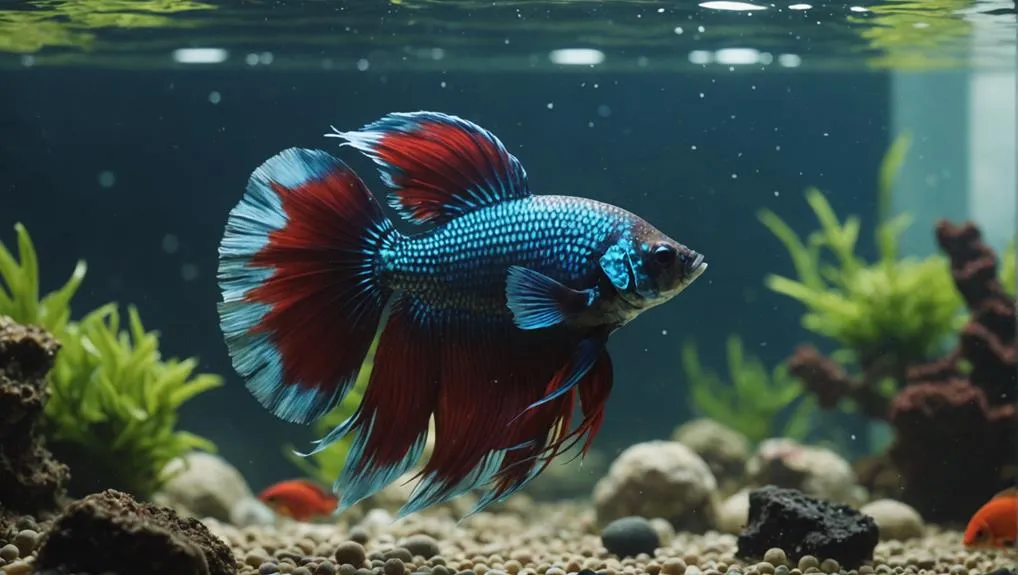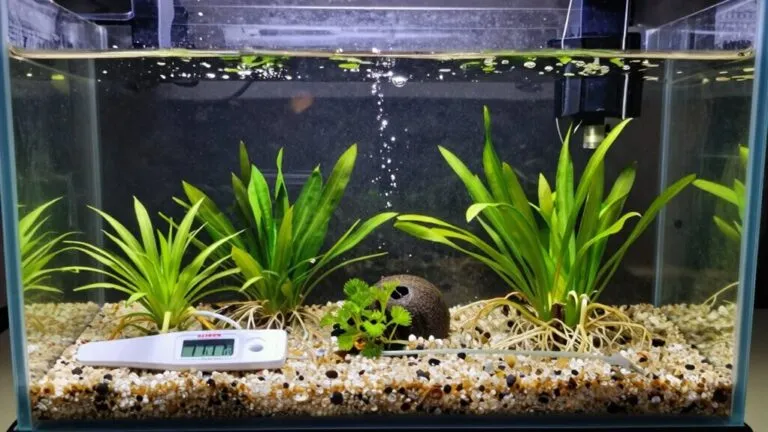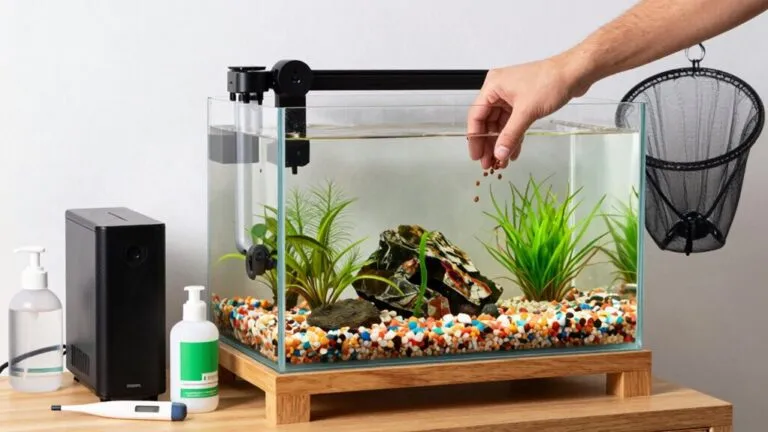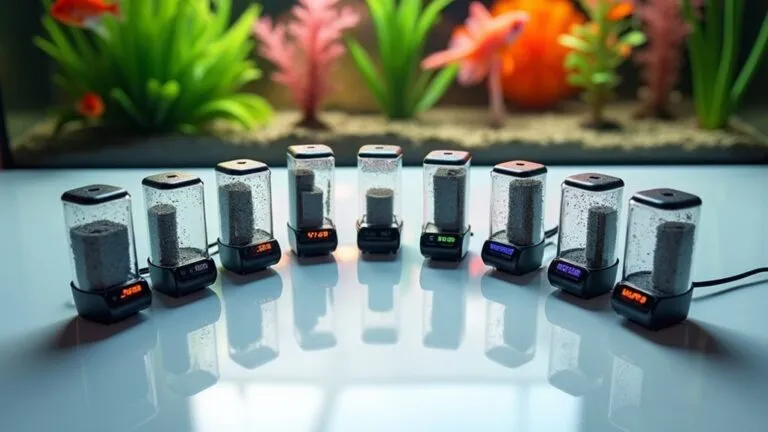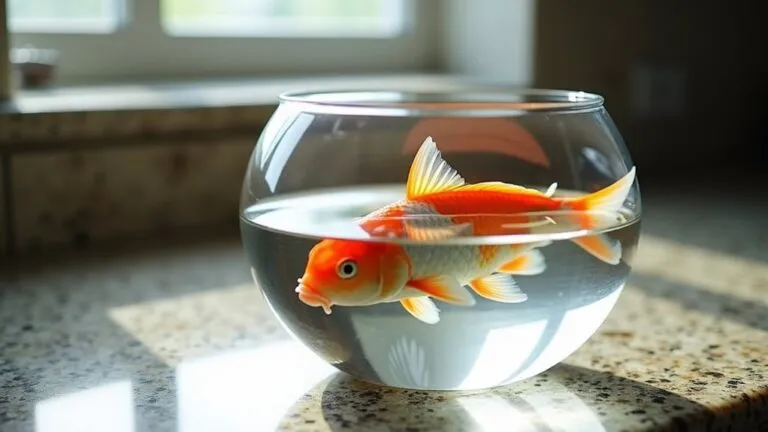If you've got a betta fish, keeping an eye on its health is super important! Look for signs like faded colors, clamped fins, or frayed tails—those can mean trouble. If your fish is acting lethargic or suddenly stops munching on its food, that's a red flag. You should also watch for weird swimming patterns or if it's rubbing against objects, which could signal irritation. Don't forget about water quality; it can majorly impact your fish's wellbeing. If any of these symptoms pop up, don't wait too long—prompt action can really make a difference! Stick around to uncover more tips for helping your betta!
Contents
- 1 Identifying Physical Symptoms
- 2 Behavioral and Feeding Changes
- 3 Common Diseases Overview
- 4 Treatment and Care Steps
- 5 Preventive Measures
- 6 Monitoring Water Quality
- 7 Recognizing Stress Indicators
- 8 Actions Upon Noticing Illness
- 9 When to Seek Veterinary Help
- 10 Frequently Asked Questions
- 11 Final Thoughts
Identifying Physical Symptoms
When you observe your betta fish, pay close attention to any physical symptoms that might indicate illness. You might notice faded coloring, especially in male bettas, which can signal stress or disease.
Maintaining optimal tank conditions, such as a temperature between 78-82°F and a pH between 6.0-7.8, can help prevent many health issues optimal tank conditions. If you see that their fins are frayed or shredded, it's a sign of fin rot, and you'll want to act quickly to avoid further damage.
Clamped fins, where your betta holds its fins tightly against its body, often indicate distress or poor health, so keep an eye out for that too.
Lethargy is another red flag. If your betta seems to lounge at the bottom of the tank or avoids swimming around, it could be a sign of illness.
Also, watch for any swelling or a loss of appetite. If your fish isn't chomping down on its food like usual, it's time to worry.
Behavioral and Feeding Changes
When your betta fish suddenly loses its appetite or starts swimming oddly, it can be a bit concerning, right?
These changes in behavior are often signs that something's not quite right, and it's worth paying attention to. Just like us, bettas can get stressed or feel unwell, so keeping an eye on how they eat and move can help you catch any issues early on.
Additionally, ensuring that your betta's environment is well-decorated with safe materials and recommended decorations is crucial for their mental health and can help mitigate stress.
Appetite Decrease
How can you tell if your betta fish is feeling unwell? One major sign is a noticeable appetite decrease. Betta fish usually have hearty appetites, so if your fish refuses to eat for more than 24 hours, it's time to pay attention. This change could signal underlying health issues like internal parasites or poor water quality that need immediate action.
Keep an eye out for other signs of trouble, such as:
- Lethargy or excessive hiding
- Unusual swimming patterns
- Changes in water quality
- Noticeable weight loss
When your betta isn't munching on their favorite flakes, they might be a sick fish. Sometimes, stress or diseases can cause these appetite changes.
It's essential to monitor how much and how often they eat. If you notice a dip in their feeding behavior, don't panic, but do act quickly. A simple water change or a check-up at the local fish store can help.
Unusual Swimming Behavior
A betta fish's swimming behavior can reveal much about its health status, especially if you've already noticed a decrease in appetite.
If your betta is suddenly swimming strangely, it's time to take a closer look. Unusual swimming behavior, like slow movements or erratic patterns, can indicate issues like swim bladder disease or parasites. You might also see your betta frequently surfacing for air or lingering near the tank's bottom, which could suggest respiratory problems or stress from poor water quality.
Keep an eye on your betta—if it starts rubbing against objects or hiding more than usual, these could be signs of skin irritations or stress.
Difficulty maintaining a stable position in the water, like constantly sinking or floating, is another red flag.
To keep your betta happy and healthy, ensure its environment is clean and stress-free. A little TLC goes a long way!
Common Diseases Overview

When it comes to keeping your Betta fish happy and healthy, knowing the common diseases they face is key.
You'll want to keep an eye out for symptoms like white spots or frayed fins, as catching these issues early can make all the difference.
Let's explore some of the most common illnesses, so you can give your fish the best care possible—because nobody wants to see their finned friend feeling under the weather!
Common Betta Fish Illnesses
Betta fish are vibrant creatures, but they can be susceptible to various illnesses that threaten their health and well-being. Understanding common betta fish illnesses is crucial for keeping your finned friend happy and thriving. Here are some prominent conditions to watch for:
- Fin Rot: This leads to ragged, frayed fins due to bacterial infections tied to poor water quality.
- White Spot Disease (Ich): Look for those pesky white spots on your fish's body and fins. It causes lethargy and can spread quickly if left untreated.
- Velvet Disease: Identified by gold or rusty dust on your betta, this serious infection affects swimming behavior and appetite.
- Dropsy: If you notice extreme swelling in the abdomen, this often signals serious health issues linked to underlying infections.
To help your betta recover, a quarantine tank can be a lifesaver. Monitoring water quality is essential, as many illnesses stem from poor conditions.
Recognizing Symptoms Early
Early recognition of symptoms is vital to ensuring your betta fish stays healthy and vibrant. You want to keep an eye out for signs of lethargy and inactivity, like your fish lounging at the bottom of the tank instead of swimming around.
If you notice a faded or dull coloration, that can indicate stress or the onset of disease, and nobody wants that!
Changes in feeding behavior are also crucial. If your betta suddenly decides to go on a hunger strike, it might be a warning sign of a serious illness.
Physical symptoms of illness, such as frayed fins or bulging eyes, can hint at conditions like Fin Rot or Popeye.
Lastly, don't ignore any surface scraping or rubbing against decorations. This often means your fish is irritated, possibly due to pesky parasites.
Remember, catching these symptoms early can make a huge difference in your betta's recovery. So, stay attentive, and you'll help keep your little finned friend happy and thriving!
After all, a happy betta makes for a happy owner, right?
Treatment and Care Steps
To effectively treat a sick betta fish, it's crucial to start by quarantining it in a separate tank. This limits disease spread and allows you to focus on targeted treatment options.
Make sure the quarantine environment is clean and stable, with optimal temperature to reduce stress. Additionally, maintaining water quality parameters such as pH and ammonia levels is essential for the recovery of your betta.
Here are some key steps to follow:
- Monitor water quality: Regularly test ammonia, nitrite, and nitrate levels, and perform water changes as needed.
- Observe behavioral changes: Keep an eye on how your betta is acting. Any shifts can be a sign of improvement or worsening symptoms.
- Follow medication instructions: If your betta has fin rot, use antibiotics, or for ich infections, an anti-parasitic solution will do the trick.
- Document progress: Write down any physical or behavioral changes, which can be helpful if you consult a vet later.
Preventive Measures

Maintaining a healthy betta fish starts long before any signs of illness appear. To keep your betta thriving, make regular water changes a part of your routine. Aim for 20-30% weekly water changes to ensure optimal water quality and reduce harmful toxins. A clean environment is key to a happy, healthy betta!
Quarantine new fish for at least two weeks before introducing them to your main tank. This simple step minimizes the risk of spreading diseases to your existing finned friends.
Plus, creating a well-structured environment with plenty of hiding spots helps reduce stress, which can lead to illness. Think of it as giving your betta a cozy little home!
Feeding high-quality food is just as crucial. It boosts your betta's immune system and keeps them feeling their best.
Keep an eye on their feeding habits, too. Any sudden changes might signal an underlying issue. After all, a healthy betta is a happy betta!
Monitoring Water Quality
Ensuring your betta fish thrives hinges on consistently monitoring water quality. By keeping a close eye on water parameters, you can prevent potential health issues and ensure a happy environment for your little friend.
Here are some key aspects to focus on:
- Check ammonia and nitrite levels: Both should be at 0 ppm, while nitrate levels should stay below 40 ppm.
- Maintain water temperature: Keep it steady between 76-82°F to avoid stressing your betta.
- Monitor pH levels: Aim for a pH between 6.5 and 7.5 to support your fish's wellbeing.
- Perform weekly water changes: Change 20-30% of the water each week to keep things clean and reduce harmful waste.
Using a reliable aquarium heater and thermometer will help you track the water temperature effectively.
Don't forget to use water conditioners to remove harmful substances from tap water before introducing it to your aquarium.
Recognizing Stress Indicators

Recognizing stress indicators in your betta fish is crucial for maintaining their health and happiness. If you notice your betta lounging at the bottom or surface of the tank, that lethargy could be a red flag. Betta fish are usually lively, so a sudden drop in energy isn't normal.
Another sign to look out for is clamped fins. When your fish keeps its fins tightly tucked against its body, it's like wearing a coat on a hot day—definitely not a good sign!
You might also spot fading color, especially in male bettas. Their vibrant hues might dull when they're stressed or unwell.
Keep an eye on their appetite, too. If your betta refuses to eat for a couple of days, that loss of appetite can indicate something's off.
Abnormal behaviors, like rubbing against tank surfaces or hiding more than usual, can signal discomfort.
Taking note of these stress indicators is essential. Your betta relies on you to create a happy, healthy environment. So, stay observant, and don't hesitate to make changes if your fish seems a bit off!
After all, a happy betta means a happy you!
Actions Upon Noticing Illness
Noticing signs of illness in your betta fish can be alarming, but taking prompt action can make a significant difference in their recovery.
First things first, make sure you document any changes you see, like lethargy or loss of appetite, along with the date and time. This helps track the progression of the disease.
Next, check the water temperature; it should be between 76-82°F. Improper temperatures can make your betta more susceptible to illness.
Keep an eye out for physical changes too. Look for symptoms like faded colors, clamped fins, or white spots, which could hint at external parasites. If symptoms persist, don't hesitate to consult a veterinarian for guidance.
Here's a quick checklist to follow:
- Document any behavioral changes.
- Check and maintain the water temperature.
- Observe for physical signs of illness.
- Regularly monitor your fish post-treatment.
Treating fish is a journey, and your care matters! Monitor their recovery closely, and make adjustments as needed. Your betta depends on you, and together, you can overcome these challenges!
When to Seek Veterinary Help

When your betta fish shows signs of illness, knowing when to seek veterinary help is crucial for their well-being. If you notice persistent lethargy, a lack of appetite, or difficulty swimming, don't hesitate. These can signal serious health issues.
Keep an eye out for bulging eyes, clamped fins, or unusual swimming patterns that last more than a day—these are red flags that mean it's time to consult a vet.
Changes in behavior, like increased hiding or surfacing for air unusually, can also indicate trouble. If your betta starts rubbing against tank decorations as if they're auditioning for a fishy dance-off, it's time for professional guidance.
Visible lesions, cloudy fluid on the body, or excessive mucous discharge are signs that warrant immediate attention.
And remember, if symptoms stick around despite your best at-home treatments or if things get worse, don't wait it out. A veterinarian can provide tailored care and run diagnostic tests to get your betta back on track.
Your little friend depends on you, so trust your instincts and act when you see these signs of illness!
Frequently Asked Questions
How to Treat Sick Betta Fish?
To treat your sick betta fish, identify symptoms clearly. Adjust tank conditions, explore medication types like antibiotics, and consider natural remedies. Follow recovery tips diligently, ensuring a stable environment for effective treatment and healing.
What Does Ammonia Poisoning in Betta Fish Look Like?
When you notice your betta's behavior changes—like gasping or rubbing against surfaces—check the ammonia levels. Recognizing symptoms early through water testing can help you implement prevention strategies and maintain a healthier tank environment.
How Do I Know if My Betta Has a Bacterial Infection?
To determine if your betta has a bacterial infection, watch for symptoms like fin rot and lethargy. Ensure optimal tank conditions, consider dietary implications, and explore treatment options to promote signs of recovery.
Is My Betta Sick or Stressed?
If your betta's like a shadow, it might be stressed or sick. Observe behavioral changes, feeding habits, and water conditions. Watch for symptoms around tank mates, as environmental stressors can impact their well-being significantly.
Final Thoughts
In the world of betta fish, spotting signs of illness is like playing detective. You can catch those sneaky symptoms before they turn into a major crisis. Remember, your little buddy relies on you for a happy, healthy life. While it's easy to feel overwhelmed, just take it one step at a time. Keeping an eye on their behavior and environment makes all the difference. So, stay observant, and let your betta thrive—after all, they're counting on you!

